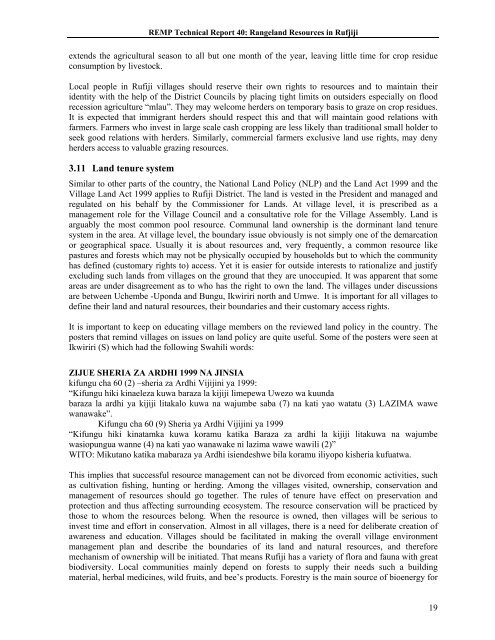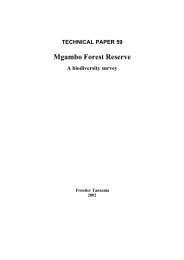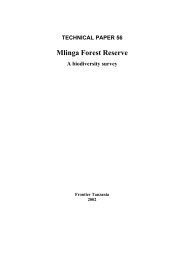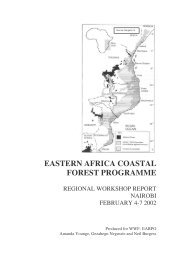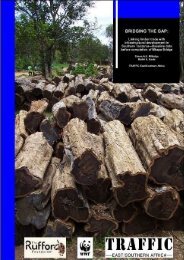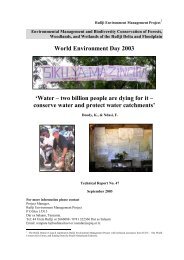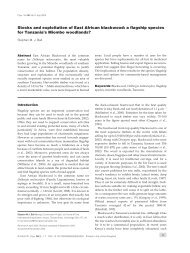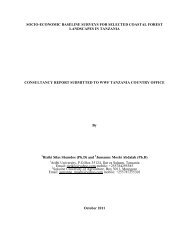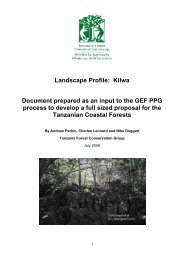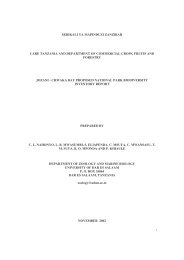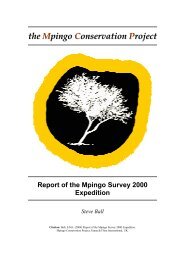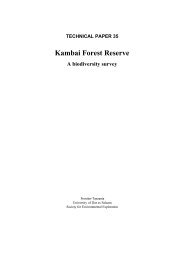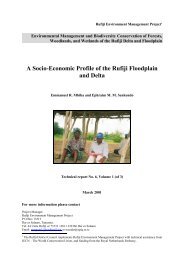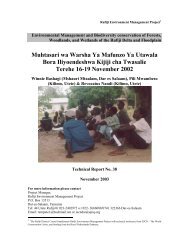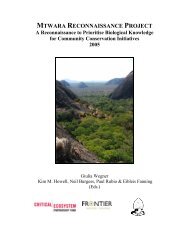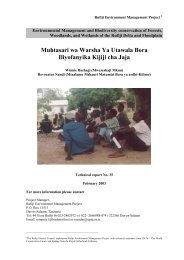rufiji environment management project - Coastal Forests of Kenya ...
rufiji environment management project - Coastal Forests of Kenya ...
rufiji environment management project - Coastal Forests of Kenya ...
You also want an ePaper? Increase the reach of your titles
YUMPU automatically turns print PDFs into web optimized ePapers that Google loves.
REMP Technical Report 40: Rangeland Resources in Rufjiji<br />
extends the agricultural season to all but one month <strong>of</strong> the year, leaving little time for crop residue<br />
consumption by livestock.<br />
Local people in Rufiji villages should reserve their own rights to resources and to maintain their<br />
identity with the help <strong>of</strong> the District Councils by placing tight limits on outsiders especially on flood<br />
recession agriculture “mlau”. They may welcome herders on temporary basis to graze on crop residues.<br />
It is expected that immigrant herders should respect this and that will maintain good relations with<br />
farmers. Farmers who invest in large scale cash cropping are less likely than traditional small holder to<br />
seek good relations with herders. Similarly, commercial farmers exclusive land use rights, may deny<br />
herders access to valuable grazing resources.<br />
3.11 Land tenure system<br />
Similar to other parts <strong>of</strong> the country, the National Land Policy (NLP) and the Land Act 1999 and the<br />
Village Land Act 1999 applies to Rufiji District. The land is vested in the President and managed and<br />
regulated on his behalf by the Commissioner for Lands. At village level, it is prescribed as a<br />
<strong>management</strong> role for the Village Council and a consultative role for the Village Assembly. Land is<br />
arguably the most common pool resource. Communal land ownership is the dorminant land tenure<br />
system in the area. At village level, the boundary issue obviously is not simply one <strong>of</strong> the demarcation<br />
or geographical space. Usually it is about resources and, very frequently, a common resource like<br />
pastures and forests which may not be physically occupied by households but to which the community<br />
has defined (customary rights to) access. Yet it is easier for outside interests to rationalize and justify<br />
excluding such lands from villages on the ground that they are unoccupied. It was apparent that some<br />
areas are under disagreement as to who has the right to own the land. The villages under discussions<br />
are between Uchembe -Uponda and Bungu, Ikwiriri north and Umwe. It is important for all villages to<br />
define their land and natural resources, their boundaries and their customary access rights.<br />
It is important to keep on educating village members on the reviewed land policy in the country. The<br />
posters that remind villages on issues on land policy are quite useful. Some <strong>of</strong> the posters were seen at<br />
Ikwiriri (S) which had the following Swahili words:<br />
ZIJUE SHERIA ZA ARDHI 1999 NA JINSIA<br />
kifungu cha 60 (2) –sheria za Ardhi Vijijini ya 1999:<br />
“Kifungu hiki kinaeleza kuwa baraza la kijiji limepewa Uwezo wa kuunda<br />
baraza la ardhi ya kijiji litakalo kuwa na wajumbe saba (7) na kati yao watatu (3) LAZIMA wawe<br />
wanawake”.<br />
Kifungu cha 60 (9) Sheria ya Ardhi Vijijini ya 1999<br />
“Kifungu hiki kinatamka kuwa koramu katika Baraza za ardhi la kijiji litakuwa na wajumbe<br />
wasiopungua wanne (4) na kati yao wanawake ni lazima wawe wawili (2)”<br />
WITO: Mikutano katika mabaraza ya Ardhi isiendeshwe bila koramu iliyopo kisheria kufuatwa.<br />
This implies that successful resource <strong>management</strong> can not be divorced from economic activities, such<br />
as cultivation fishing, hunting or herding. Among the villages visited, ownership, conservation and<br />
<strong>management</strong> <strong>of</strong> resources should go together. The rules <strong>of</strong> tenure have effect on preservation and<br />
protection and thus affecting surrounding ecosystem. The resource conservation will be practiced by<br />
those to whom the resources belong. When the resource is owned, then villages will be serious to<br />
invest time and effort in conservation. Almost in all villages, there is a need for deliberate creation <strong>of</strong><br />
awareness and education. Villages should be facilitated in making the overall village <strong>environment</strong><br />
<strong>management</strong> plan and describe the boundaries <strong>of</strong> its land and natural resources, and therefore<br />
mechanism <strong>of</strong> ownership will be initiated. That means Rufiji has a variety <strong>of</strong> flora and fauna with great<br />
biodiversity. Local communities mainly depend on forests to supply their needs such a building<br />
material, herbal medicines, wild fruits, and bee’s products. Forestry is the main source <strong>of</strong> bioenergy for<br />
19


